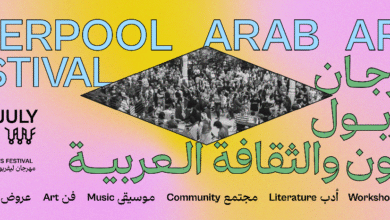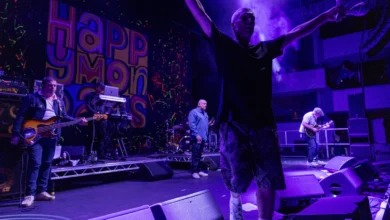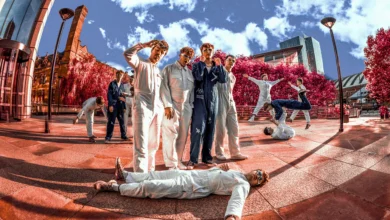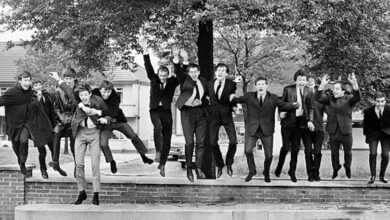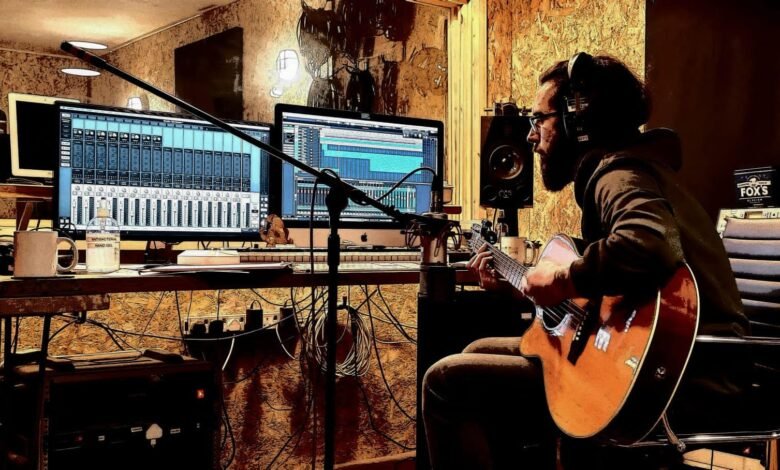
In Conversation – Jon Lawton (Crosstown Studios)
We caught up with the very much in demand producer / engineer Jon Lawton of Crosstown Studios, and asked him about his recording and producing philosophy….
Liverpool Noise: When did you start the studio, and why?
Jon Lawton: I started Crosstown Studios in 2008, initially as a mixed facility with rehearsal space and my own small studio in one of the rooms. I had always recorded my own music, and this felt like a good way to have a permanent setup, where the rent was subsidised by the practice spaces. In reality, the rehearsal rooms took up way more time than I’d expected, and after running into issues with the landlord, I decided to take a chance at recording/producing full time from a different premises.
LN: There seems to be more and more music being created on laptops these days. Has a recording studio now become – in some people’s eyes – a niche product?
JL: I personally don’t think that it has. There was definitely a growing concern when the cost of home recording equipment became very affordable, but after the dust settled on that boom, most people I knew that had invested in a setup, soon came back to the studio. People don’t want their creative time spent trying to set up a laptop in the spare room, stressing when the interface doesn’t speak to the computer and cursing the dog when it ruins the perfect take. And the majority of people, missed having someone to bounce their ideas off who was going to tell them the truth!
LN: What would you say are the benefits of working in Crosstown Studios? Is it all about the equipment you have? What other factors come into play?
JL: Liverpool’s blessed with a lot of great recording studios, producers and engineers, and each one seems to operate in its own unique way. We keep up-to-date with the latest software, and invest as much as we can in reliable equipment, but I don’t think that’s the only reason people use us.
I often end up playing a lot on the tracks I produce, which can solve a big headache lots of songwriters have. Not everyone can afford the sessions players they’d like, so being able to come to a session, alone, and leave with a full band sound is a big plus for lots of songwriters. This can often lead to co-writes or eventually playing live with clients when the records are finished.
We also keep a full backline at the studio with plenty of left and right handed instruments. This is something I always wanted in place, to help bands get the best possible result from their sessions. You can get the bus to our studio, without needing to bring any gear, and we can start recording. This solves issues for a lot of musicians.Oh, and the coffee’s good!
LN: What are the roles of an engineer and a producer?
JL: For me, they’re basically one and the same. Apart from the occasional session playing job, I’ve never worked at a studio where these rolls are separated anymore. With the majority of projects we do being self-funded, you have to take on as many rolls as possible to help the client complete their project in budget. So I always view producing and engineering the same, everything we do is ultimately for the benefit of the song anyway.
LN: What is your favourite production technique at the moment?
JL: This is a hard one to answer as I work across so many genres, what works for a metal band, might not be great on a ukulele track! But I am enjoying playing around with samplers at the moment and starting to make my own Kontakt instruments, but really every session is completely different.
LN: You are an extremely good guitarist yourself. Does the fact that you are a musician help the recording process?
JL: Thanks very much! I think it has to help with the recording process, as ultimately, you can have the best mic in the world, pointed at the greatest amp you’ve ever heard, but if you know that the guitarist is jamming in the wrong scale, it’s never going to gel with the track!
LN: What advice would you give to a band who has never recorded in a studio before, but are about to?
JL: Don’t record the song you finished last night, I know it’s the best song you’ve ever written, but live with it for a few weeks first, something will get tweaked! Rehearse! Know your song as best as you can, know your parts, know your bandmates parts, and listen to the lyrics. Learning the details can stop costly arguments in the studio. Manage your expectations. I’ve disappointed hundreds of drummers when they learn “there isn’t a plugin to make you sound like John Bonham.” And practice, practice, practice.
LN: What have been your stand-out sessions to date, and why?
JL: Most of my stand-out sessions are the ones that didn’t quite go to plan. The Two Black Sheep album that was completed in a mammoth 14 hour session, where they also went and played two 45 minute sets in the same night, springs to mind. (There’s one track on that album that came out very “guitar-y”…)
I’m still proud of the first track I worked on for Sami Yusuf, ‘Healing’. I tracked the guitars through the night as Sami’s team were working to a very tight schedule. The track came together great and has now had over 20 million views on YouTube. It also started a long working relationship with Sami, both live and in the studio that continues to this day.
LN: There is an old adage….”It can be sorted in the mix”. How true is this?
JL: It’s not a recording technique I ever rely on, but if time is closing in, and the bass player can’t quite hit that high backing vocal, I guess it can technically be “fixed in the mix”.
LN: What are your thoughts on the current Merseyside music scene?
JL: The amount of music coming out of Merseyside always amazes me. The really impressive part is just how diverse it is. I speak with friends who are also musicians, artists, promotors or run record labels, all working in or around Liverpool, and often, they work with a completely different set of musicians/bands than I do. All busy, and all making waves in their own way.
LN: Best bit of kit you ever bought for the studio?
JL: My favourite piece if equipment is my Focusrite ISA430. This is not at all glamorous, but there’s just something in it’s design that sounds great to my ear. I picked it up after reading it’s what Bjork recorded some vocals through, and now I use it on something in almost every session.
LN: Worst piece of kit you ever bought for the studio?
JL: With the world of YouTube reviews, I don’t often buy a piece of gear I’m hugely disappointed with. I do have a problem with impulse buying guitar pedals, some of which can end up in the draw very quickly.
LN: Who are your current favourite producers?
JL: My current favourite producers are Kurt Ballou (Cult Leader, Converge) and Omar Rodriguez Lopez (The Mars Volta), both also guitarist/producers with healthy effects pedal collections!
Steve Kinrade
Photo Credit: John Jenkins




